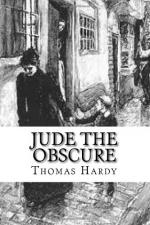|
This section contains 2,248 words (approx. 8 pages at 300 words per page) |

|
SOURCE: "Individuation and Consummation in Hardy's Jude the Obscure: The Lure of the Void," in The Victorian Newsletter, No. 82, Fall, 1992, pp. 62-64.
In the following essay, Kelly studies Jude's existential separation from society and his desire for "a sense of belonging and integration."
"He could not realize himself."
(Jude the Obscure 60)
The peripatetic motif in Jude the Obscure, Hardy's final novel, is obvious to any reader confronted with Jude's wanderings in Hardy's six Parts: from Mary green to Christminster; from Melchester to Shaston; from Aldbrickham and "Elsewhere"—back to Christminster again, where Jude chooses finally to die, to become unreal. The fact of Jude's rootlessness clearly enhances his isolation from community, his obscurity (read worthlessness) in society's eyes, and his pain in existing as an individual—his rootlessness demonstrating Every-modern-man's predicament: the struggle to overcome disconnectedness and fragmentation. Jude's isolation, separateness, and obscurity remit only suffering. In Jude's...
|
This section contains 2,248 words (approx. 8 pages at 300 words per page) |

|


